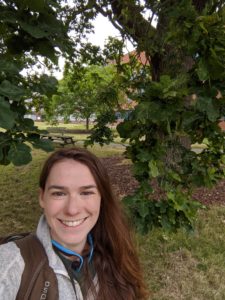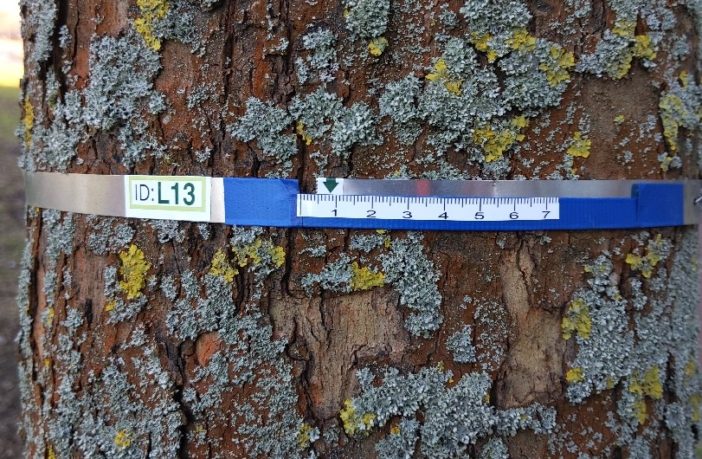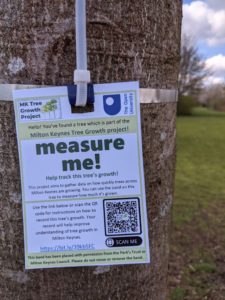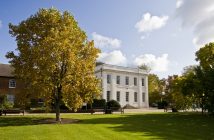Trees are vital for our towns and cities. They make them more sustainable, attractive and healthy places to be. But urban trees are constantly under threat, with less access to water, soil and room to grow.
These threats can hamper tree health, slow their growth and eventually kill them. Experts aren’t entirely sure why some urban trees thrive while others struggle, because in the UK there’s been insufficient research done on urban tree growth and what impacts on growth rates.
But now an Open University PhD student is carrying out a first of its kind study to find out more.
Kate Hand is studying trees in Milton Keynes and analysing the benefits they provide to society, such as removing air pollution and combating climate change, and she wants local people to get involved.

Kate Hand OU PhD Student
Her project is a collaboration between the OU and the Urban Forest Research Group at Forest Research, the UK’s leading forestry research organisation. It’s taking place in Milton Keynes with the support of the Park’s Trust and Milton Keynes Council, whose trees are being measured in the study.
Kate says she was really surprised when she discovered during her studies that there was so little information on how quickly urban trees grow in the UK, but is confident this study will unearth the missing data.
Kate said:
“The MK Tree Growth Project is a first of its kind study in the UK to track tree growth as it allows the public to get involved in measuring the growth of their local trees. This is really exciting as with the help of the public we can collect more data on urban tree growth than we could otherwise, helping us answer these questions more quickly. We’ve got 99 trees fitted with a growth band which anyone can measure and submit a reading for, helping us build a picture of how growth is impacted by things like climate and conditions around the tree. We can then use this growth data to monitor benefit delivery, like how much carbon the tree is removing from the air – which helps to combat climate change.”
Dr Kieron Doick, Head of the Urban Forest Research Group at Forest Research, said:
“This project is another exciting collaboration between Forest Research and the OU and we’re really pleased to be involved. Kate is filling an important gap in our knowledge on the performance of trees in the urban realm that will help inform future species selection and support tree managers to plant trees that give optimal benefit to those that live and work in our towns and cities. Kate is also harnessing the good will and interest of volunteers, which will benefit them as well in terms of getting contact with nature and the satisfaction that they’ll know they’ve contributed to important research.”
Rob Riekie, Landscape and Operations Director for The Parks Trust, said:
“We are delighted to be able to support this research project. To further understand and improve our knowledge regarding the performance of trees in the urban environment will help us in the future with things as species selection, choosing the right species for the right location and generally support tree managers in their work by helping us make more informed decisions. For local people to be able to get involved in the project is a real bonus as well”
Dr Philip Wheeler, Senior Lecturer in Ecology, at The Open University said:
“Milton Keynes has more trees than most UK cities and so it’s an excellent real world laboratory for investigating urban trees. People are becoming more and more aware of the benefits that trees provide, but we really need to know more about trees in urban spaces to allow us to make the most of them. Kate’s work is so important because it’s trying to see how members of the public can help us improve our knowledge of urban trees, that will ultimately benefit everyone in MK, and throughout the country.
Why we need urban trees
The research will also help scientists predict the value and the benefits that urban trees will provide us in the future. In London, for instance, urban trees are estimated to store over 2 million tonnes of carbon, worth £147 million. These £-values for the benefits trees provide can help us demonstrate how important urban trees are, helping protect existing trees in our neighbourhoods and support planting of new trees where they’re needed most.
Measure a tree in MK
In addition to soaking up and storing carbon dioxide, urban trees provide many other benefits. They are good for our mental health and wellbeing by providing green and restful spaces for us to exercise, relax or socialise, they can help against flooding and they’re also useful for giving a helping hand to urban wildlife.
Here’s how to get involved:
- Visit the webpage to find a tree with a growth band and view the step-by-step guide to participating in the project
- Visit the tree, you’ll either need a smartphone which can read QR codes, or just a piece of paper where you can take notes and enter the information through a computer / tablet later
- Once you find a tree it should take less than five minutes to submit a reading
- Check the webpage to see your record added to our tree growth tracker chart
Link to webpage: TreeGrowth MAR (arcgis.com)




